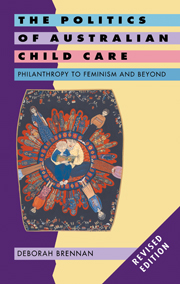Book contents
- Frontmatter
- Contents
- List of tables
- Acknowledgements
- List of abbreviations
- Preface to the Revised Edition
- Introduction: Women, the State and the Politics of Caring for Children
- 1 The Kindergarten Movement and Urban Social Reform
- 2 For the Sake of the Nation
- 3 A Mother's Place …?
- 4 Hitching Child Care to the Commonwealth Star
- 5 Playing Beneath the Sword of Damocles
- 6 For Love and Money
- 7 Child Care – an Industrial Issue
- 8 New Players, New Rules
- 9 Equity and Economics
- 10 The Market Rules … OK?
- References
- Index
7 - Child Care – an Industrial Issue
Published online by Cambridge University Press: 26 January 2010
- Frontmatter
- Contents
- List of tables
- Acknowledgements
- List of abbreviations
- Preface to the Revised Edition
- Introduction: Women, the State and the Politics of Caring for Children
- 1 The Kindergarten Movement and Urban Social Reform
- 2 For the Sake of the Nation
- 3 A Mother's Place …?
- 4 Hitching Child Care to the Commonwealth Star
- 5 Playing Beneath the Sword of Damocles
- 6 For Love and Money
- 7 Child Care – an Industrial Issue
- 8 New Players, New Rules
- 9 Equity and Economics
- 10 The Market Rules … OK?
- References
- Index
Summary
Of all the issues which constantly recurred in discussion [with factory women], one alone stood as the most tremendous, gut-tearing, and paralysing enigma, to which there was no adequate solution - the problem of what to do about the responsibility they felt for their children. It far surpassed every other problem in the degree of anxiety it produced.
Helen Hurwitz (1977: 226)Historically, trade unions in Australia have concentrated on improving the pay and conditions of male workers and have disregarded, or even been hostile to, the interests of women. The resistance of male unionists to the long campaign waged by women for equal pay has been a principal source of conflict. Until as late as 1977, the ACTU supported the notion of a ‘family wage’ and sought to discourage the necessity for families to have two incomes. In keeping with this, the ACTU's child care policy called for child care services to support the needs of 'women who under present economic circumstances have to work' (Hargreaves 1982: 31). During the late 1960s and early 1970s, however, a number of changes occurred which affected the way both men and women perceived the relationship of women to trade unions. Throughout these years married women entered the labour market in increasing numbers, and, as women's participation in the labour force increased, so did their participation in unions.
- Type
- Chapter
- Information
- The Politics of Australian Child CarePhilanthropy to Feminism and Beyond, pp. 141 - 163Publisher: Cambridge University PressPrint publication year: 1998



